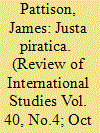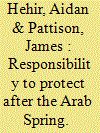| Srl | Item |
| 1 |
ID:
173366


|
|
|
|
|
| Summary/Abstract |
The cyber realm is increasingly vital to national security, but much of cybersecurity is provided privately. Private firms provide a range of roles, from purely defensive operations to more controversial ones, such as active-cyber defense (ACD) and ‘hacking back’. As with the outsourcing of traditional military and security services to private military and security companies (PMSCs), the reliance on private firms raises the ethical question of to what extent the private sector should be involved in providing security services. In this article, I consider this question. I argue that a moderately restrictive approach should be adopted, which holds that private firms can justifiably launch some cybersecurity services – defensive measures – but are not permitted to perform others – offensive measures.
|
|
|
|
|
|
|
|
|
|
|
|
|
|
|
|
| 2 |
ID:
141051


|
|
|
|
|
| Summary/Abstract |
There has been widespread and vociferous condemnation of Somali piracy and several states have used force against the pirates. This reflects the prevailing view of pirates as belligerents and aggressors who act wrongly. In this article, I challenge this view by defending the conditional moral permissibility of piracy. More specifically, I first argue that piracy can be morally permissible when certain conditions are met. These are what I call the principles of ‘justa piratica’, that is, the principles of just piracy. Second, I claim that these conditions are likely to apply to some Somali pirates. Third, as a corollary, I argue that the case of piracy shows that one of the shibboleths of Just War Theory – that a war cannot be just on both sides – is mistaken.
|
|
|
|
|
|
|
|
|
|
|
|
|
|
|
|
| 3 |
ID:
145727


|
|
|
|
|
| Summary/Abstract |
The Responsibility to Protect (R2P) has become the pre-eminent framework for discussing humanitarian intervention and issues related to human rights protection generally. Its origins lie in the 2001 report of the International Commission on Intervention and State Sovereignty (ICISS), which first proposed the notion of the ‘Responsibility to Protect’. Its adoption at the 2005 United Nations (UN) World Summit, with over 160 heads of state in attendance, has led to numerous inter-disciplinary debates within academia and beyond. The R2P has often been controversial, but the eruption of the ‘Arab Spring’ in late 2010 has constituted the concept’s most exacting test and prompted a further spike in interest in both its efficacy and desirability. The articles in this special issue assess the R2P in light of the events during, and debates surrounding, the Arab Spring. Together, they constitute a uniquely focused assessment of this significant and influential doctrine.
|
|
|
|
|
|
|
|
|
|
|
|
|
|
|
|